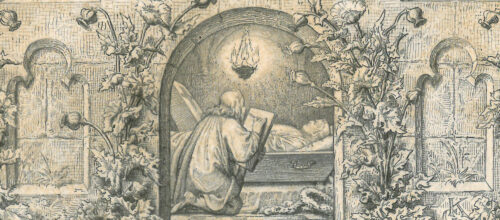Lutheran Spotlight: Johannes Bugenhagen
If the Reformation is compared to a vine, the work of men like Johannes Bugenhagen may be likened to a trellis. Bugenhagen was a reformer without whom...
If the Reformation is compared to a vine, the work of men like Johannes Bugenhagen may be likened to a trellis. Bugenhagen was a reformer without whom...
To run to the ends of the earth preaching the Gospel is precisely Jesus’ charge to his Apostles (Acts 1:8). Luther writes about them, “Their running, I say, is truly sweet, that is, their ministry is most delightful, not like that of Moses and the prophets. To run means to serve in the office of preacher..."
In the Small Passion Albrecht Dürer devotes three woodcuts to the Scriptural accounts of Easter day enabling us, with our own eyes, to see holy events as if they are happening right now. He places you, me, and himself as participants in salvation's narrative as he draws us into the resurrection of Christ.
Luther says that suffering should not be something we choose. We can’t choose which cross we bear. That’s up to God. Luther addresses this with four reasons.
"A Christian is an utterly free man, lord of all, subject to none. A Christian is an utterly dutiful man, servant of all, subject to all."
From its roots in the Reformation to its carefully preserved remnant today, the history of confessional Lutheranism in Finland is a testament to the work of the Lord establishing and keeping His Church throughout all generations in every corner of the world.
Clearly Luther saw marriage and the estate of the family as important, but what does this mean for us? Seeing how important this was for Luther first of all gives us an insight as to how we should encourage people to view marriage and the family in our time.

Martin Luther died at 3:00 AM on February 18, 1546. Contrary to the expectations of Luther and many of his colleagues, he did not die in Wittenberg, the location of many of his greatest accomplishments.
When Philipp Melanchthon spoke on Luther’s death in 1546, he said about himself and his fellow Lutherans, “We resemble orphans bereft of an excellent and faithful father.”
In contrast to other notable reformers of his day, Luther believed that music was “a gift of God to be nurtured and used by man for his delight and edification, as a means for giving praise to the Creator, and as a vehicle for the proclamation of God’s Word.
Philip Melanchthon, through his own vacillations on certain doctrines and his irenic spirit that ended up seeking peace at the expense of the truth. It would not be his enemies, however, who would heal these wounds, but his students.
This film will enlighten the Church to Dr. Rosa J. Young’s remarkable history as a pioneer Lutheran educator and missionary.
Among his many contributions to the church, Luther also transformed and ennobled the German language through his translation of the Bible.
The Babylonian Captivity of the Church appeared in print less than a week before the papal bull against Luther reached Wittenberg in October, 1520. Both works were being prepared at the same time: while Rome was working to prosecute Luther’s heresy trail, Luther was putting the Roman sacramental system on trial.
In 1517 when Luther nailed his 95 Theses to the door of the Castle Church in Wittenberg, Albrecht Dürer's magnificent painting, Adoration of the Magi, hung just inside the church mere feet away!